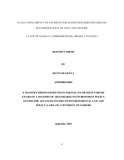Evaluating Impact of Payment for Ecosystem Services (Pes) on Household Wealth and Land Tenure:a Case of Kasigau Corridor Redd+ Project in Kenya
Abstract
Human society depends on healthy ecosystem for their goods and services. However, the lack of
market values for these ecosystem services (ES) has resulted into continued degradation through
human activities in pursuit of economic development. Payment for ecosystem service (PES) has
emerged as a market based approach that translates external, non-market values of the
environment into incentives to encourage continued provision of these ES. Through PES, users
of ecosystem services pay landowners who supply these services through land use activities.
However, there are limited empirical studies evaluating the impact of PES.
Kasigau Corridor REDD project is one of the PES projects being implemented to address both
environmental conservation and contribute to alleviate poverty hence improving the livelihoods.
However, there are no empirical data to support the argument that a PES project can achieve
these two objectives in Kenya. The purpose of the study was to evaluate the impact of PES on
household wealth of those participating as well as find out how its implementation relates to land
tenure systems that is, communal and private land tenure.
To study applied the propensity score matching (PSM) using the ‘with and without’ approach.
This was done through the identification of a control and treated groups under similar conditions
and comparing the difference between the two groups from a total sample of 250 households.
Using the logistic regression analyses, the findings showed that the PES project recorded an
increase of 11.1 per cent on the household wealth and that community land tenure was more
favourable to PES implementation compared to private land tenure. In addition, the total land
and education level of the participants were found to also significantly influence participation
and implementation of PES. In conclusion, the study has indeed showed that indeed PES can be
used to promote environmental conservation as well contribute to poverty alleviation. In
addition, households in community land are more likely to participate in PES, therefore, security
of land tenure is key to successful implementation of these program.
Citation
Master of Arts in Environmental Policy of University of Nairobi , 2012Publisher
University of Nairobi, Centre For Advanced Studies In Environmental Law & Policy (caselap)

